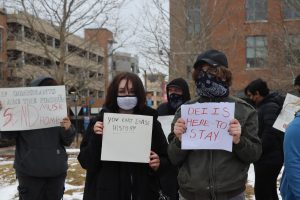13 reasons why you shouldn’t watch ‘13 Reason Why’

Opening screen for ’13 Reasons Why’ on Netflix
April 26, 2017
The new Netflix series called ‘13 Reasons Why,’ based off of the best selling young adult novel by Jay Asher, has created a lot of buzz and sparked some controversy.
The story follows a teen named Clay Jensen, as he tries to uncover the reasoning behind the suicide of his classmate, coworker, and crush, Hannah Baker. For the 13 reasons, Hannah makes 13 tapes, which then leads to the series being 13 episodes long.
Each episode represents each reason why Hannah Baker took her own life, one reason tagged directly to people and how their actions affected her life.
This show brushed over many things that are set to help prevent triggering scenes, as well as the idea of mental illness being linked to suicide.
Here are 13 reasons why you shouldn’t watch 13 Reasons Why. Warning this article could spoil the show if haven’t watched prior to reading.
Mental illness is glossed over
The weird part of this show is how they treat mental illness. Suicide isn’t always directly caused by mental illness; however, depression and the way depression can lead to things like suicide is often rooted deeper than just how other people have impacted your life.
The shows focus more on the dramatic reasons of suicide rather than the realistic ones. That’s good for entertainment, but it leaves many of the harsh realities of teen suicide brushed off to the side.
It never addresses the subject matter of mental illness, which is a major component when starting to talk about suicide.
Isn’t the proper way to portray a suicide
The American Foundation of Suicide Prevention has set specific guidelines on how to safely portray suicide without inadvertently causing more deaths. The series blatantly disregarded those guidelines.
They graphically showed Hannah sitting in her bathtub as she slits her wrists and then shows her struggling to breathe as she slowly bleeds out. This could result in many other suicidal teens to go down the same path, and cause more teen deaths.
Glorification of committing suicide
The series glorifies and almost romanticizes suicide by making it seem like killing oneself and leaving tapes/a note is the only way to effectively send a message to the world. But in reality the opposite is true – the most effective way to send a message is to survive, thrive, and tell your story to the world to empower other people to stay alive and not give up.
Over simplification
The show made it seem like suicide is easy and the only option you have. It simplified it by making it seem like it is a direct result of being bullied or sexually assaulted when in reality these issues are much more complex than the show portrays.
Could discourage struggling teens from reaching out
The story conveys all of the other characters as unhelpful, unsupportive, and only out to hurt Hannah, and made it seem like none of them were there when she reached out for help.
This could discourage many teens who are in a similar situation as Hannah from reaching out to their friends or family for help which could also result in many more teen deaths due to suicide.
Hannah blames everyone else
Hannah essentially blames others for her being dead; in reality, suicide is a choice made by those who commit it. Hannah did deal with bullying and she was sexually assaulted, often factors of suicidal intentions and mental illness, but the decision to commit suicide is solely in the hands of the individual who commits it.
Justifying self-harm as a coping mechanism
Skye, a character in the show that worked at the cafe Hannah used to go to, justifies her self harm by saying “it’s what you do instead of killing yourself,” which simplifies and glorifies self harm and makes it seem like a normal thing that happens. It also makes it seem like a good ‘compromise’ instead of taking your own life.
Provides no out for other teens
The show didn’t provide a resource for those struggling with similar issues to Hannah, which goes against the guidelines set by the American Foundation of Suicide Prevention.
The creators of the show had little to no interest in taking advice from the professionals or considered the potential negative impact this show could have on the people who watch this show.
Brushes off the signs of suicide
Hannah’s school guidance counselor, Mr. Porter, brushes off the clear signs of her being a suicide risk, which is illegal and not realistic to what a trained professional would do in that situation. He almost blames her for what Bryce did to her when he raped her.
Very offensive to people struggling with these issues in real life
This show is highly offensive to anyone who is struggling with mental illness or suicidal thoughts. Throughout the series Hannah never really develops as a character, or shows any sign of her having a mental illness – it just makes her seem dramatic and attention seeking, which brings in stereotypes.
Never shows healthy ways to handle trauma
‘13 Reasons Why’ never offers a healthy solution to the trauma of a classmate killing herself. It also never shows a healthy way to deal with being bullied or raped. The only solution it offered was the one Hannah chose, which was killing herself.
Hannah kills herself because of the things that happened to her, but her classmate and former friend Alex takes his life as a result of what Hannah did.
Makes other people feel guilty for her death
Hannah made people like Clay feel guilty for her being dead. This is extremely cruel and inconsiderate, and not something many people who commit suicide would do.
The series treats suicide like some type of perfect revenge, when if reality suicide is about feeling hopeless and overly sad and is a personal decision you can make for yourself. Hannah was going to take her life.
Inaccurate portrayal of the whole issue
The show doesn’t accurately and fairly portray the issues, or adequately address the main factors in suicide. It also doesn’t show the true and raw pain behind the things Hannah sees or has done to her.
Throughout the series it shows Hannah’s anger behind the things that happened to her but never shows the true pain she feels. It isn’t until the last episode that it addresses this. She says, “Justin and Jessica who each broke my heart. Alex, Tyler, Courtney, and Marcus who each helped to destroy my reputation. Zach and Ryan who broke my spirit. The last tape being for Bryce Walker the one who broke my soul.”
Although the show didn’t properly handle the overall concept of mental illness, bullying, sexual assault, and suicide, they did make the rape scenes and the suicide scene very difficult to watch and made sure it was uncomfortable. They stayed true to how uncomfortable and truly hard it is to handle these things, which is actually a positive about the show.
Watching a girl get rape shouldn’t be easy and watching a girl slit her wrists shouldn’t be easy either. I do think there should be some type of warning in the description so people who have gone through this know before hand and aren’t psychologically affected by the scenes in this show.





